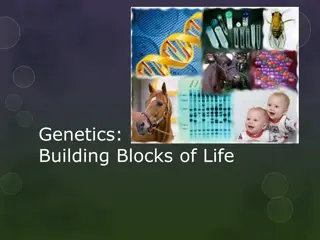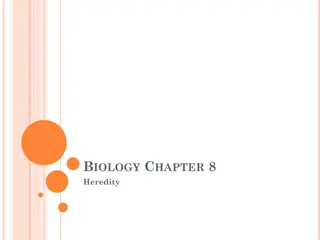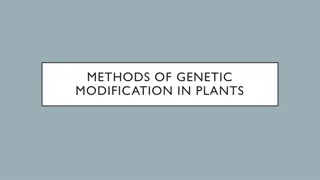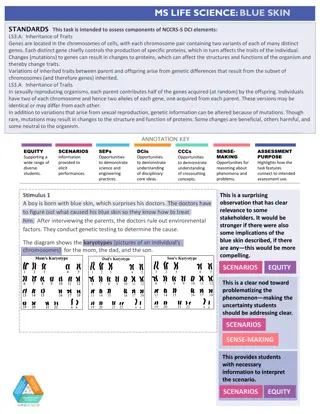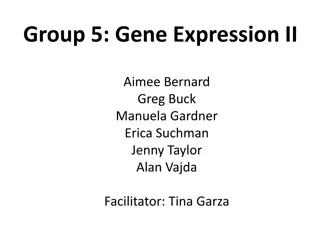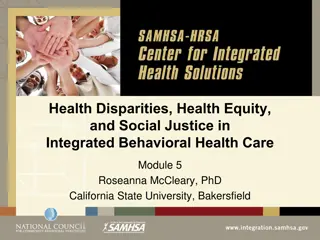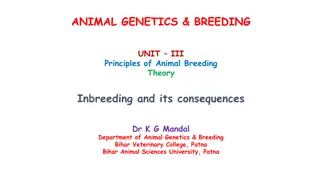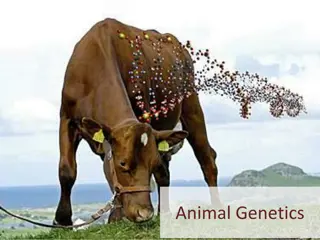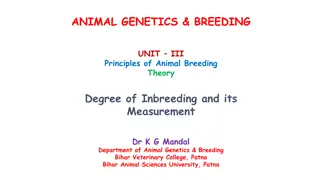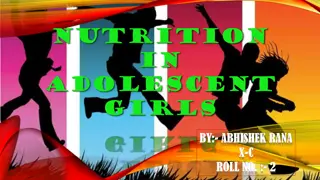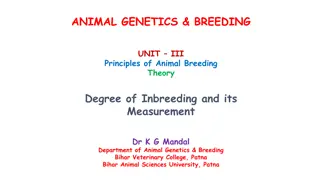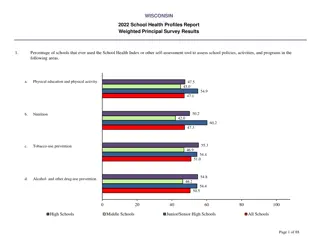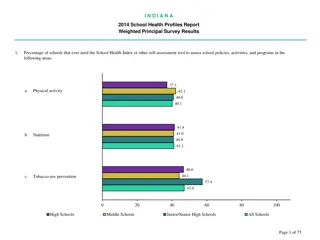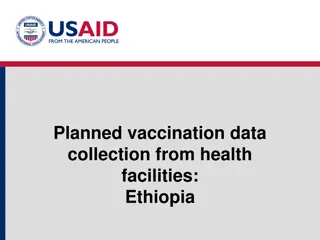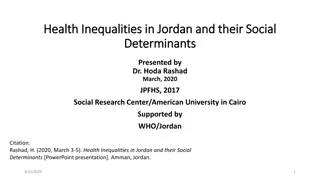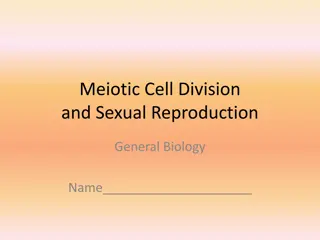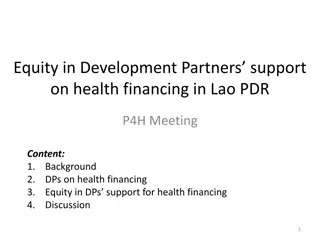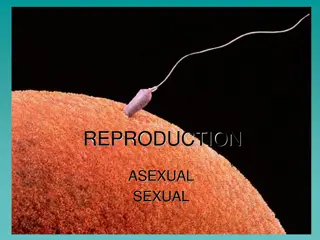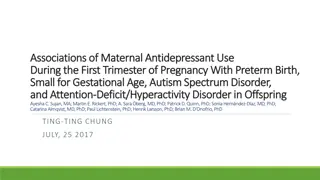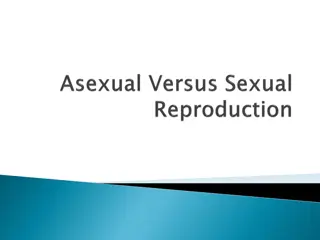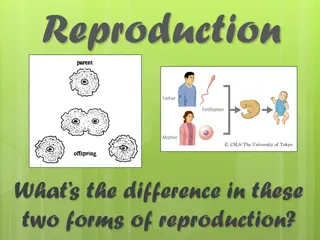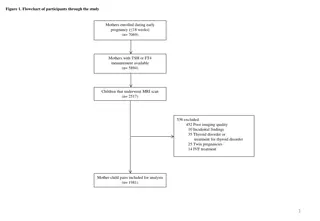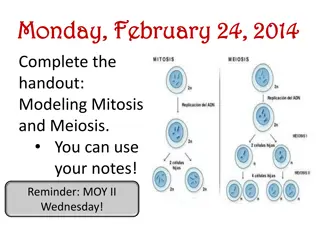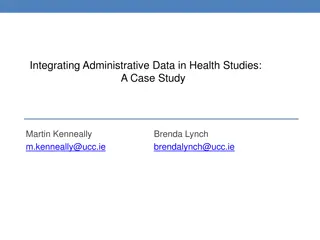A Student Exploration of the Global Impacts of Climate Change on Human Health
This research delves into the effects of climate change on human health, covering how a warming climate, changes in precipitation, and increased flooding frequencies impact various health aspects such as infectious diseases, nutrition, and mental health. The study provides a visual model illustratin
5 views • 17 slides
Guide to Efficient Rodent Breeding and Colony Management
This comprehensive guide covers essential aspects of rodent breeding, colony management, and tips for successful rodent reproduction. It includes details on weaning, retiring breeders, records management, problem-solving, resources, goals and planning, breeding systems, reproduction processes, genot
4 views • 35 slides
Understanding Genetic Testing and Cancer Screening
Genetic testing involves the analysis of germline genes to determine the risk of developing certain cancers or passing on risks to offspring. It can provide valuable insights into cancer risks, help inform relatives about potential risks, but may have limitations and risks such as cost and insurance
0 views • 10 slides
Genetics: The Blueprint of Life
Genetics is the study of heredity and how traits are passed from parents to offspring. It involves understanding genetic makeup (genotype) and physical attributes (phenotype) determined by genes. Mendel's laws of segregation and independent assortment explain how alleles and traits are inherited. Nu
0 views • 34 slides
Understanding Mendel's Experiments and Principles of Genetics
Delve into the pioneering work of Gregor Mendel, the father of genetics, as he conducted groundbreaking experiments with pea plants, identified key principles of genetics, and introduced the concept of dominant and recessive traits. Explore how Mendel's work laid the foundation for our understanding
4 views • 23 slides
Different Methods of Genetic Modification in Plants
Genetic modification in plants can occur through natural selection, selective breeding, and induced mutations. Natural selection involves breeding compatible species to create offspring with desired traits, while selective breeding is a multi-generational process to breed organisms with specific cha
1 views • 11 slides
Understanding Inheritance of Traits Through Blue Skin Case Study
Assessing genetic inheritance and mutations using a case study of a boy with blue skin. The scenario highlights how genes control traits, the random assortment of chromosomes in offspring, and the impact of mutations on protein function. Students analyze karyotypes to infer genetic differences betwe
0 views • 6 slides
Epigenetics in Biology: Exploring the Impact of Parental Diet on Offspring Traits
Explore the fascinating world of epigenetics in biology through a focused unit on how parental diet can influence offspring traits. Dive into learning goals, outcomes, and a detailed tidbit outline that includes activities and resources for understanding the molecular mechanisms behind these effects
0 views • 21 slides
Understanding Health Disparities and Equity in Behavioral Health Care
This module explores the significance of health disparities, health equity, and social justice within integrated behavioral health care. It delves into the role of addressing disparities, promotes ways to achieve equity in care models, and discusses the key organizations dealing with health disparit
0 views • 28 slides
Understanding Inbreeding and Its Consequences in Animal Genetics & Breeding
Inbreeding in animal breeding involves mating closely related individuals, resulting in common ancestors within the preceding generations. This practice can have both positive and negative consequences on genetic diversity and health. Various types of inbreeding such as selfing, full-sib mating, and
0 views • 18 slides
Understanding Animal Genetics: A Comprehensive Overview
Animal genetics is the study of heredity, inheritance of traits from parents to offspring, genetic material like DNA, chromosomes, genes, alleles, and nucleotides. It involves the understanding of chromosomes in different livestock species, DNA as the carrier of genetic information, genes as units o
0 views • 67 slides
Understanding Degree of Inbreeding in Animal Genetics and Breeding
Degree of inbreeding refers to the extent to which an individual carries genes identical by descent. This concept is crucial in animal breeding as it affects genetic diversity and homozygosity in offspring. The coefficient of inbreeding is used to measure the level of inbreeding, with higher values
1 views • 30 slides
Importance of Nutrition in Adolescent Girls
Adolescence is a crucial period where proper nutrition plays a vital role in supporting physical growth and preventing future health issues. Nutritional deficiencies during this time can impact a girl's development and may have repercussions on her future health and that of her offspring. Understand
0 views • 9 slides
Understanding Degree of Inbreeding and its Measurement in Animal Genetics and Breeding
Degree of inbreeding in animals is the extent to which genes are identical by descent within an individual. The coefficient of inbreeding, denoted by F, measures this degree and represents the increase in homozygosity in offspring from closely related matings. Two sources of homozygosity are genes a
0 views • 15 slides
Understanding Mental Health in Tower Hamlets: Key Stats and Strategies
The Tower Hamlets JSNA report for February 2019 sheds light on the prevalence of mental health issues in the borough, highlighting statistics such as higher rates of mental health disorders compared to London. It emphasizes the importance of addressing wider determinants of mental health and the nee
1 views • 52 slides
Understanding Health Disparities and Medicaid's Role in Advancing Equity
Health and health care disparities refer to differences in health outcomes and access to care among different groups, often linked to social, economic, and environmental inequities. People of color face longstanding disparities in health and health care, with factors inside and outside the health ca
5 views • 16 slides
New Faculty Workshop Series: Student Health and Wellness Connection is Prevention
The New Faculty Workshop Series on Wednesday, September 15, 2021, focuses on student health and wellness, emphasizing prevention at the University of Connecticut. Featuring speakers Suzanne Onorato, Executive Director of Student Health and Wellness (SHaW), and Kristina Stevens, Director of SHaW Ment
0 views • 24 slides
Wisconsin 2022 School Health Profiles Report
The Wisconsin 2022 School Health Profiles Report provides insights from a weighted principal survey on various aspects of school health programs. Results include the percentage of schools using self-assessment tools, engaging in wellness policy activities, and overseeing health programs. The data hi
0 views • 88 slides
Indiana 2014 School Health Profiles Report
The Indiana 2014 School Health Profiles Report provides insights on the percentage of schools using self-assessment tools for assessing various health areas, inclusion of health-related objectives in school improvement plans, reviewing health and safety data in improvement planning, and oversight of
0 views • 75 slides
WHO's HiAP Framework and Global Mandates for Health Equity
This content discusses the HiAP Framework for Country Action and Global Mandates for promoting health equity. It covers resolutions, declarations, and recommendations by various organizations to address social determinants of health and reduce health inequities. The WHO Director-General is urged to
0 views • 11 slides
Vaccination Data Collection and Health Care System in Ethiopia
Planned vaccination data collection is underway in health facilities in Ethiopia, with teams visiting Enumeration Areas and health centers to ensure children are vaccinated. The health care system in Ethiopia includes Health Centers at regional, zonal, and woreda levels, staffed with health officers
0 views • 9 slides
Health Inequalities in Jordan: Social Determinants and Priorities
This study by Dr. Hoda Rashad in Jordan explores health inequalities and their social determinants, analyzing 85 health indicators in various categories like child health, non-communicable diseases, reproductive health, and health system performance. Key findings reveal progress in child mortality,
0 views • 24 slides
Understanding Punnett Squares for Predicting Offspring Genotypes
Punnett squares are a visual tool used to predict the possible genotypes and phenotypes of offspring based on the parent's genetic makeup. By following simple steps and understanding dominant and recessive traits, you can calculate the likelihood of different genetic outcomes for traits like hair co
0 views • 7 slides
Understanding Meiotic Cell Division and Sexual Reproduction in General Biology
Meiosis is a crucial process in sexually reproducing organisms where cells divide to produce sex cells with half the normal number of chromosomes. This ensures genetic variation in offspring. Meiosis takes place in specific cells of an organism with paired chromosomes (diploid cells), leading to the
0 views • 18 slides
Equity in Development Partners Support on Health Financing in Lao PDR P4H Meeting
The meeting focuses on addressing health indicators, inequities, and health financing challenges in Lao PDR. It analyzes the background of health indicators, inequities by socio-economic status and ethnic groups, and the current health financing situation in the country. The discussion delves into s
0 views • 23 slides
Understanding Reproductive Modes: Asexual vs. Sexual
Reproduction can occur through asexual or sexual means, each with its distinct processes and outcomes. Asexual reproduction involves only one parent and produces genetically identical offspring, while sexual reproduction involves the fusion of specialized sex cells from two parents to create genetic
1 views • 46 slides
Associations of Maternal Antidepressant Use During Pregnancy with Offspring Outcomes
Prenatal antidepressant exposure during the first trimester of pregnancy is linked to various adverse outcomes in offspring, including preterm birth, small for gestational age, autism spectrum disorder, and attention-deficit/hyperactivity disorder. This study evaluates the associations and alternati
0 views • 28 slides
Maternal Effect on Shell Coiling in Snails
Maternal effects play a crucial role in determining the coiling direction of snail shells. The maternal inheritance of organelle genes controls certain traits in offspring, with the direction of shell coiling being a classic phenotype exhibiting maternal effects. The genotype of the female parent de
0 views • 7 slides
Understanding Annual Health Checks for People with Learning Disabilities
Annual Health Checks (AHC) are essential for individuals over 14 years old with learning disabilities to review their physical and mental health. Conducted by GPs or health professionals, these checks help in detecting, treating, and preventing new health conditions. By being on the learning disabil
0 views • 8 slides
Reproduction in Organisms: A Comparison of Sexual and Asexual Methods
Reproduction in organisms involves two main methods - sexual and asexual. In sexual reproduction, two parents contribute genetic information, leading to unique offspring, while asexual reproduction involves a single parent producing genetically identical offspring. This article explores the differen
0 views • 16 slides
Understanding Types of Reproduction in Organisms
Organisms reproduce through asexual and sexual reproduction methods. Asexual reproduction involves one parent and produces uniform offspring, like in binary fission, budding, and regeneration. Sexual reproduction involves two parents and results in offspring with varied traits. Both methods have the
0 views • 24 slides
Asexual Reproduction and Passing of Traits
Asexual reproduction involves cell division to create genetically identical offspring. This process includes binary fission, budding, fragmentation, and vegetative growth. Offspring produced through asexual reproduction inherit traits directly from the parent organism. Understanding asexual reproduc
1 views • 24 slides
Understanding Health Education and Promotion Concepts
Health education is the process through which individuals and groups learn to promote, maintain, and restore health while addressing risks and preventing diseases and injuries. Health promotion involves planned actions to improve living conditions conducive to health, empower individuals, and create
0 views • 29 slides
Maternal Thyroid Hormones and Offspring Brain Development: Study Flow and Findings
This study examined the association between maternal thyroid hormones (TSH and FT4) during early pregnancy and offspring brain morphology. A flowchart illustrates participant enrollment and exclusion, with subsequent MRI analyses on child brain volumes. Results show significant associations between
0 views • 4 slides
Understanding Genetics: Mendel's Experiments and Inheritance Patterns
Delve into the world of genetics through Mendel's groundbreaking experiments with pea plants, exploring traits inheritance, Punnett squares, dominant and recessive alleles, incomplete dominance, and co-dominance. Gain insights into how traits are passed from parents to offspring and predict offsprin
0 views • 9 slides
Scottish Public Health Observatory: Enhancing Health Information for Better Decision Making
The Scottish Public Health Observatory collaborates with NHS National Services Scotland to provide health information, intelligence, and statistical services supporting NHS in enhancing quality improvement in health care. They analyze national health data to improve population health and reduce heal
0 views • 16 slides
Health Education for Social Change: A Strategy for Public Health Development in Nigeria
The practice of health education in Nigeria dates back to the 1950s, playing a crucial role in promoting health and well-being. Health education provides vital information to the populace, empowering individuals to make informed decisions for better health outcomes. It covers a wide range of topics,
0 views • 12 slides
Integrating Administrative Data in Health Studies: A Case Study
This case study explores the integration of administrative data in health studies focusing on profiling the health status of Irish regions in 2010. The objectives include linking regional health profiles to prescribing patterns, incorporating demographics and drug scheme coverage rates, and simulati
0 views • 17 slides
Essential Diet Requirements for Adolescent Girls
Nutrition is crucial for adolescent girls as it impacts their future health and that of their offspring. Nutritional deficiencies during this period can lead to delayed physical growth, sexual maturation, and affect bone strength. Adequate nutrition prepares girls for potential pregnancy and lactati
0 views • 19 slides
EU4Health Programme: Transforming Public Health in Europe
The EU's financial strategy and priorities in the health domain are highlighted through the EU4Health programme, aiming to enhance public health in Europe. The HaDEA is actively involved in improving health in the Union, protecting against cross-border health threats, ensuring availability of afford
0 views • 11 slides



